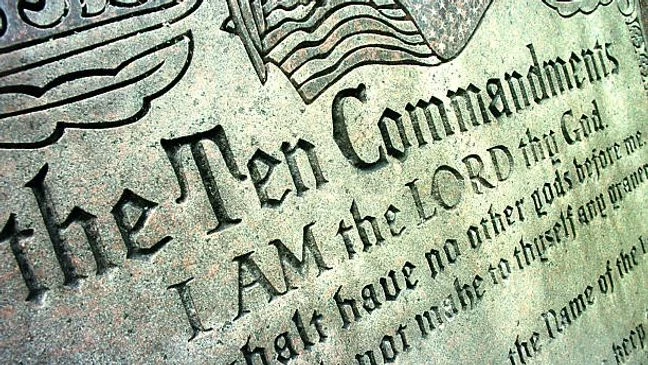Texas has become the largest state to pass a Ten Commandments law requiring the display of the Ten Commandments in every public school classroom. Governor Greg Abbott signed the bill in 2025, mandating that all 9,100 public schools across Texas must place a framed copy or poster of the Ten Commandments in a visible spot within each classroom. The display must be at least 16 by 20 inches and use a specific English version of the text. This law affects nearly six million students and is part of a growing trend among conservative-led states to promote religious expression in public education.
The Ten Commandments are a set of biblical principles that have played a significant role in Judaism, Christianity, and Islam. Supporters of the Ten Commandments law argue that the text represents more than religious beliefs; they say it is a historical document that influenced American legal and ethical systems. According to lawmakers who backed the bill, the law aims to highlight these foundational values that have shaped the country’s laws and education. Representative Candy Noble, a co-sponsor of the legislation, emphasized that the goal is to bring attention to materials that are important historically and educationally.
Despite support from many Republican lawmakers and religious groups, the Ten Commandments law has drawn strong criticism. Opponents argue that public school classrooms are not the proper place for religious symbols or instruction. Civil rights groups and religious freedom advocates say that mandating the display of the Ten Commandments violates the principle of separation of church and state established in the First Amendment of the U.S. Constitution. They worry that such laws promote one particular religious viewpoint over others and exclude students from diverse religious backgrounds or no religious affiliation.
A coalition of faith leaders from different religions, including Christians and Jews, sent a letter to Texas lawmakers warning that the Ten Commandments law could alienate students who do not follow these teachings. They stressed that public schools must remain inclusive spaces where students of all backgrounds feel welcome and respected.
The legal challenges to the Ten Commandments law are expected to be significant. Similar laws have faced court battles in other states. For example, Louisiana passed a similar law requiring the Ten Commandments to be displayed in public schools, but federal courts blocked the measure, ruling that it was unconstitutional. Judges in those cases found that the law advanced a religious message, which public schools are prohibited from doing. Texas Attorney General Liz Murrell has declared her readiness to defend the new law and is prepared to take the case to the U.S. Supreme Court if necessary.
Governor Abbott has a long history of supporting religious displays in public spaces. In 2005, while serving as Texas Attorney General, he successfully argued before the Supreme Court to keep a Ten Commandments monument on the grounds of the Texas Capitol. That case set an important precedent in legal debates about religion in public settings and continues to influence discussions about laws like the current Ten Commandments law in Texas.
In addition to the Ten Commandments law, Governor Abbott also signed another measure allowing public school districts to offer a daily voluntary period during school hours for prayer or reading religious texts. This period is optional and open to both students and staff members, reflecting a broader effort to promote religious expression in public education.
The Ten Commandments law is part of a wider political movement seen in several conservative-led states, where lawmakers have introduced similar bills to encourage religious expression in schools. These efforts have ignited debate across the country, as many people question how far states should go in blending religion with public education.
Opponents of the law warn that it could lead to division among students and families from different faiths. They argue that public schools should remain neutral and focus on providing an inclusive learning environment for all students, regardless of their religious beliefs.
The coming months will likely bring legal battles as courts evaluate the constitutionality of Texas’s Ten Commandments law. Until then, public schools across the state are preparing to implement the new requirements and adapt to the changes in their classrooms.







